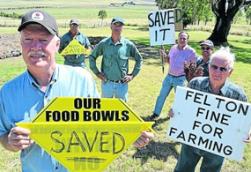Big mining projects need community approval as well as government licences. It’s a sign of a healthy democracy when politicians respect a community’s social licence, writes Julie Macken
 Blogpost by Julie Macken, originally posted on newmatilda.com
Blogpost by Julie Macken, originally posted on newmatilda.com
For the last decade the mining industry has successfully argued that the damage done to the environment, to farmland and rural communities by its operations is small compared to the benefits the industry provided for the whole nation. It was so confident the community approved of its business that it publicly and aggressively prosecuted its case for not paying any more tax on its super profits. It appeared content to let rumours swirl around the role it played in removing Kevin Rudd from his prime ministership. Its social licence looked rock solid.
But social licence is a curious thing, not to mention hard to pin down. It could be that the mining’s industry’s is being withdrawn by communities from the east to west coast of Australia. Indeed not since I had the good fortune of writing a weekly column for the AFR called “A Word from our Sponsors” have I seen so much written about how mining corporations manage that tricky tension between getting the profits they want and managing an increasingly critical local community.
However, little of the commentary on the mining industry has addressed the central issue of what happens when the community totally withdraws its licence to operate. It’s an important question because the answer, in theory, is what separates a democracy from a corporate oligarchy.
The most recent outing of this curious management development came to light on 30 July, in the sleepy hamlet of Felton, Queensland.
Four years ago, Ambre Energy decided Felton, a lush valley in Queensland, would make a great location for an open-cut mine and petro-chemical plant. The community of Felton disagreed and immediately created the Friends of Felton, one of the most effective rural lobby groups to emerge over the last few years.
They decided they would not engage in either a mitigation or adaptation discussion with the company, they would simply demand no mining takes place in their valley. Within a few years it looked like they had not only won the battle by denying the company its plans, but had also won the war when the LNP guaranteed that, should they win the state election, they would not allow the company to build either a mine or a petro-chemical plant.
All was quiet until three weeks ago when a consultancy called, Futureye sent letters out to most families in Felton, encouraging them to participate in a process that would access the “social licence” for a coal mine and coal to liquids plant in the Felton Valley. The locals were staggered at what appeared to be either unbelievable stupidity or breathtaking arrogance. As one resident said, “What part of no does the company not understand?”
But to keep things very clear and simple the community got together and burned all the letters as a way of making it clear there was no social licence being offered to Ambre to operate in that community. Then Queensland Mines Minister, Andrew Cripps, reaffirmed the government’s opposition last week, saying the proposed mine was “not in the public interest”.
The company’s response? According to one newspaper report the company said it believed it had support for the mine and that it would continue to conduct research and would re-approach the government if it achieved “significant support” in the community.
Then last week new research revealed that of the 500 people polled, over 75 per cent of Newcastle residents did not support the construction of a fourth coal loader. Port Waratah Coal Services wants to expand its operation in Newcastle port and increase capacity by between 60 to 100 million tonnes per year. But residents cite damaging dust pollution, health, traffic and noise as some of their major concerns.
Seventy-five per cent is a sizable chunk of the city’s population and a politician would be a fool to ignore such a resounding majority of opinion. But does anyone seriously think that Waratah will have its plans knocked back just because the community doesn’t want it?
It’s at this point concerns about the nature and resilience of our democracy begin to stir. Only time will tell whether it is possible for the people of Newcastle to withdraw their social licence for greater expansion of the coal industry.
Tonight there are two events on that go to the question of agency and social licence. The first is a public meeting in Newcastle to discuss the proposed new coal terminal for Newcastle. The second is a debate in Sydney at the City Recital Hall Angel Place. A no-holds barred debate will tackle the question of whether farmers have the right to say no to miners.
One of the panellists arguing the case for the negative is none other than the CEO of those social licence specialists, Futureye, Katherine Teh-White. Hopefully someone will tackle the very tricky question of what happens to democracy when the right to say no is withdrawn in the interests of a corporate oligarchy.
Macken Sense is a weekly metabolic breakdown of media and green events by our astute commentator, Julie Macken. Follow Julie Macken on Twitter @juliemacken


